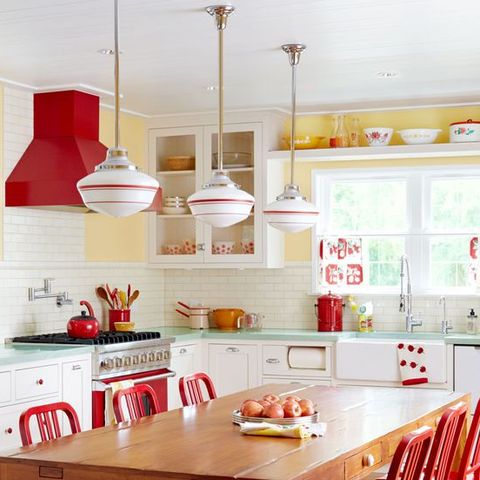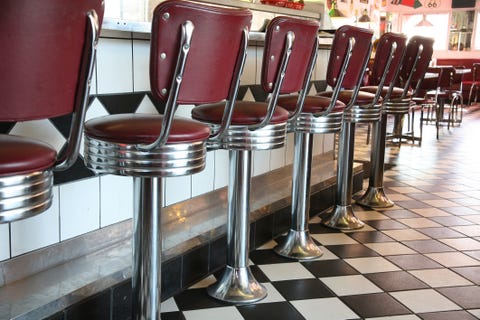Coaster Contemporary Style Dining Chairs

David Tsay/Stylist: Liz Strong
To the untrained eye, identifying the specific style or era a piece of furniture is from is not always easy. There's contemporary design and then there's modern, you've got traditional and transitional—the nuances of each style, although important, can be hard to discern without a decent amount of research. However, there's one category of furniture I'm pretty sure most of us can easily identify, and that's retro. That's because the idea that something is so retro simply means it is obviously or purposefully date-able to the recent past.
The category of retro furniture is less specific than a certain style, like mid-century modern or French provincial, and more overarching to describe pieces that are decidedly outdated but appealing today because of their outdated-ness. Their appeal is fairly subjective, and while some pieces might be conventionally attractive, others are liked for the nostalgia they evoke or the fact that they're deliberately kitschy.
What Qualifies as Retro Furniture?
To distinguish what retro furniture is, it's important to point out what it's not. Antiques are not retro. Antiques are typically defined as being at least 100 years old, whereas retro furniture mostly dates from the 1950s to the 1980s. That said, you can also find new furniture that was made to look retro, intentionally referencing the trends of this era. A good example is Smeg's '50s-inspired kitchen appliances.

Zeke Ruelas
Retro furniture is also not timeless. These are not "classic" pieces because they're not meant to be. Their identity will always be tied to the decade the style first became popular in. While mid-century modern furniture technically falls into the era of retro furniture, most of the designer pieces associated with that style are viewed as ingenious, highly valuable examples of classic design that will always be attractive (and in another 50 years, sure to be considered desirable antiques). But there are plenty of '50s- and '60s-era furniture and decor designs that don't necessarily get to be elevated alongside an Eames chair, but are still retro. For example, the sparkly vinyl seats and chrome accents reminiscent of a quintessential '50s diner.

Nicholas Free Getty Images
Here's what you can expect to find within each decade of retro furniture:
1950s: The '50s saw a big transition in furniture design and manufacturing because of the new materials accessible. Plastic, vinyl, plywood, and laminate were all newly developed materials that enabled radical design developments. Furniture got slimmer and sleeker. Non-upholstered pieces no longer had to be made strictly out of wood. A lot of designs that still appear "modern" to us (à la the Space Age) were born out of this decade as America looked to the future.
1960s: A lot of the furniture shapes and styles remained the same through the '60s, but the introduction of bright colors and psychedelic patterns is what sets this decade apart. Mod-inspired geometric patterns and funky-shaped chairs particularly define this decade.
1970s: As we entered the '70s, the shapes of furniture started to shift, with bulkier designs coming back into style. The color palette also changed a good deal: more muted, nature-inspired hues like olive green, goldenrod yellow, any shade of brown, and of course, orange, were all really big and used in big-impact ways.
1980s: '80s decor went in several directions, and there are iconic designs reminiscent of each one. There was chintz, there were pastels and ruffles, there were also neons, there was mirrored furniture, and also country-western inspired decor. Yep, there was a lot going on. But as with the fashion of the decade, one common theme remained: Go big or go home.
How To Get The Retro Look:
Certain retro furniture and decor will be more widely appealing and desirable than others, but you will almost always have luck finding some interesting original pieces at local (but not high-end) antique and thrift stores. You can also browse online at sites like Chairish, Ebay, and Etsy for true retro items.
Shop Retro-Inspired Picks

Crosley Bates Outdoor Sofa

Josey Swivel Chair
urbanoutfitters.com
$279.00


Follow House Beautiful on Instagram.
Maggie Burch Contributing Writer Maggie writes about interiors, real estate, and architecture for House Beautiful.
This content is created and maintained by a third party, and imported onto this page to help users provide their email addresses. You may be able to find more information about this and similar content at piano.io
Coaster Contemporary Style Dining Chairs
Source: https://www.housebeautiful.com/design-inspiration/a25849100/what-is-retro-furniture/
